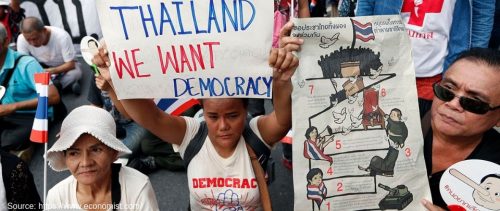Asia Centre’s Interviews 2019

Looking Ahead to Next Year: Southeast Asia’s Big 2020 Elections
“As James Gomez of the Asia Center in Bangkok has shown, recent election seasons in Cambodia, Indonesia, Malaysia and Thailand have included politicians, faith-based groups and other actors using disinformation to mobilize political supporters. He believes that Myanmar could easily fall into the same pattern.”
Read the article here
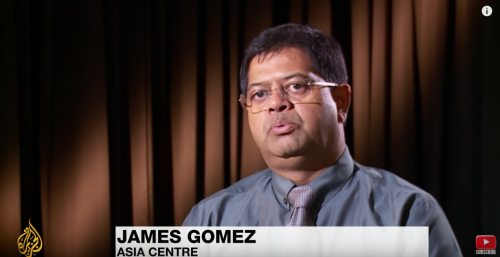
Aung San Suu Kyi to appear at ICJ as Myanmar faces genocide case
On 3 December, Dr. James Gomez spoke with Al Jazeera English on Aung San Suu Kyi’s image declining in the eyes of the international community. Dr Gomez argued that, while in the past years the international community sympathized with her more, this has turned to disappointments due to her defence of the use of #Myanmar’s armed forces against the #Rohingya situation. With the #ICJ case, we should expect to see a rise of hate speech against the #UN, INGOs and activists who call for accountability for the genocide committed against the Rohingyas.
Watch the interview here

Hate speech intensity and trajectory could shift in Myanmar 2020 elections
On 30 November 2019, Asia Centre’s Dr. James Gomez’s interview on hate speech in Myanmar and its effects on the upcoming election on Mizzima English. “In the Myanmar case, ethnic and religious based hate speech stands to morph along the lines of political ideology and values, and this requires special attention and remedial action in the run up to the November 2020 election”.
Read the interview here
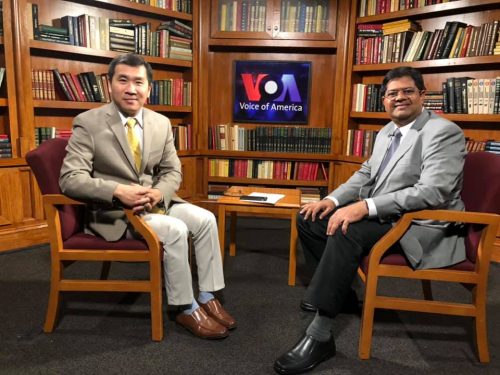
Expert Concerns Over Rising Fake News and Hate Speech in Southeast Asia
On 18 October 2019, Asia Centre’s Dr. James Gomez discussed how fake news in Southeast Asia can often lead to hate speech against marginalised groups and political opposition on VOA Khmer in Washington interviewed by Men Kimseng. Dr. Gomez informed that fact-checking, political literacy and quality journalism could partially help to mitigate the problem.
Watch the interview here
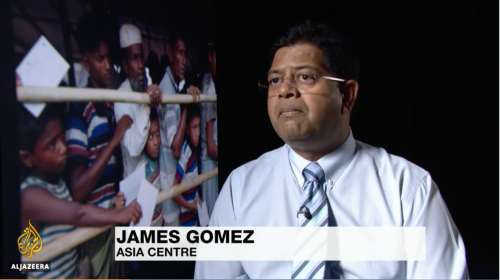
Economics expected to overshadow human rights in ASEAN summit
On 2 November 2019, Asia Centre’s Dr. James Gomez discussed on the sidelines of the ASEAN summit over Al Jazeera . Dr. Gomez argued that some governments and INGOs in trying to find pathways to access Myanmar economically and are in the process compromising and trading down the political rights of the Rohingya community. Such governments and INGOs need to be identified and called out.
Watch the interview here.

Heavy price to pay for spreading fake news
On 3 October 2019, Asia Centre’s, Dr. James Gomez commented on the Singapore’s new “Protection from Online Falsehoods and Manipulation Act” on the 89.9 BFM: The Business Station. As evidenced by events leading up to the new law now put into place, Dr. Gomez said government critics and civil society activists are likely to remain the prime targets in the run up to the city-state’s next general elections.
Listen to the podcast here.
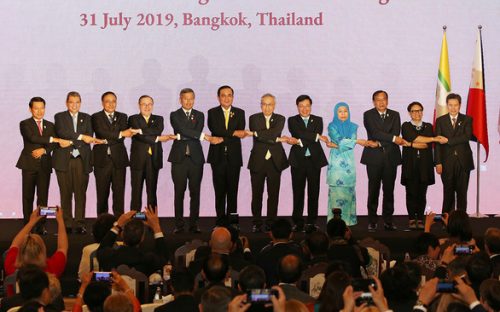
ASEAN unity and the South China Sea
On 7 August 2019, Asia Centre’s Dr. James Gomez was interviewed by journalist Du Nhat Dang from the Vietnamese newspaper Tuoi Tre. Dr. Gomez pointed out that ASEAN unity is increasingly subverted by China’s influence over Cambodia and Laos. He suggested that it’s best ASEAN members and other external powers adhere to the United Nations Convention on the Law of the Sea (UNCLOS) and the principle of Free and Open Indo-Pacific to avoid open conflict.
Read the interview here.

ASEAN Members’ should hold their ground and not give into China
On 29 July 2019, Asia Centre’s, Dr. James Gomez discussed security issues with reporter Nguyen Ngoc Phuong from Vietnam Television on the sidelines of the 52nd ASEAN Ministerial Meeting. With reference to the tensions in the South China Sea, Dr. Gomez said ASEAN members states have to hold their ground and appeal to the UN Convention on the Law of the Sea otherwise they will be over run by China.
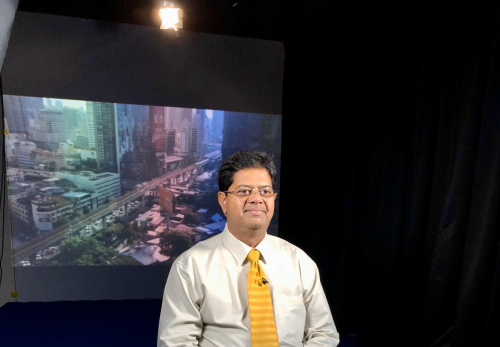
Response to US Sanctions Against Myanmar Generals and International Criminal Court Investigations into the Rohingya Refugee Crisis
On 18 July 2019, Asia Centre’s Dr. James Gomez was live on Al Jazeera – قناة الجزيرة commented on the US sanctions against the Myanmar generals and their family from entering into the US and the arrival of the International Criminal Court delegation in Dhaka to open an investigation into alleged crimes against the Rohingya people in Bangladesh and in the Rakhine state of Myanmar. Responding to the US sanctions on the top four Burmese generals, Dr. Gomez says it is only a symbolic sanction and not effective as most Burmese prefer to consider countries like Japan, Singapore, South Korea, Thailand as their first preferred destination for healthcare, holidays, study and work than the US. With regards to the ICC investigation, Dr. Gomez questioned whether the Bangladesh government will fully cooperate with the ICC as it risks worsening relations with its neighbor Myanmar.
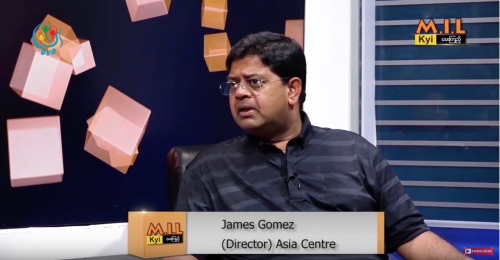
Media Literacy Programme on Disinformation in Myanmar
On 8 June 2019, Asia Centre’s Dr. James Gomez was interviewed by Myanmar’s DVB TVnews for a media literacy programme on what constitutes disinformation and fake news. During the interview Dr. Gomez explained the different types of disinformation campaigns and how it relates to Myanmar’s 2020 general elections. He noted that internet penetration will continue to grow and this will impact traditional mainstream media shape and how news will be consumed during the elections. Last but not least, Dr. Gomez offered suggestions such as enlisting the young generation to help with peer fact-checking.
Watch interview here

Singapore’s fake news law: a lesson to Asia in stifling dissent?
Dr. Gomez on 9 May 2019 provides an insight into the reasons given by states to introduce fake news laws. “Using the argument of maintaining social harmony to pass legislation to control hate speech.Operationally, such laws are often used to curb political criticism of long standing regimes. You often see this played out during elections”
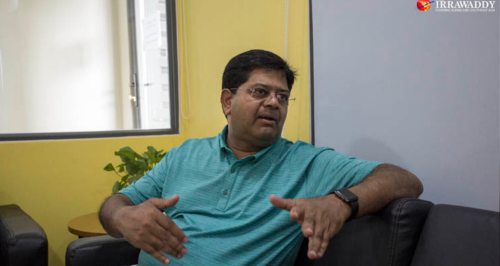
The Role of Fake News in Politics, Stability and Elections
Legislation is being introduced across Southeast Asia to combat fake news in the name of preserving social harmony. In practice, however, it is too often used by long-sitting regimes as a tool to discredit political opponents ahead of critical events such as elections and referendums. As a result, democratic values like freedom of expression and press freedom are directly impacted by legal retaliation to what governments call “fake news” written by their critics.
Read Dr James Gomez’s interview with the Irrawaddy on World Press Freedom Day 3rd May 2019 here.
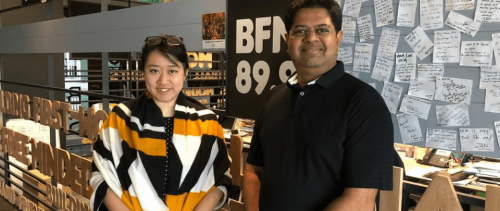
From Fake News To Fake Elections
Dr. James spoke to the 89.9 BFM: The Business Station about the fake news legislation in the region, its impact on elections and the intersection of disinformation and false election results with Lyn Mak in Malaysia on 22 April 2019.
Listen to the interview here.
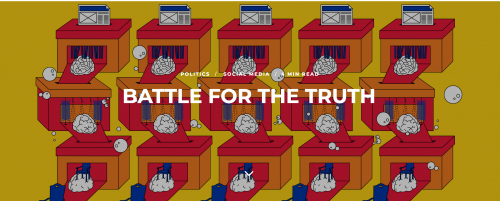
Battle for the Truth
Governments across Asia, namely in Thailand, Indonesia, Japan, the Philippines, and India, are considering ways to tackle the problem of disinformation on social media, particularly as they gear up for crucial elections in 2019.
Read Asia Centre’s mention in the article on 16 April as Dr Gomez focuses on how in Malaysia, an anti-fake news bill was passed in April 2018, before the general election which was designed to “shape and manipulate online discussion in favour of Najib Razak’s government during the election period.
Read the article here.
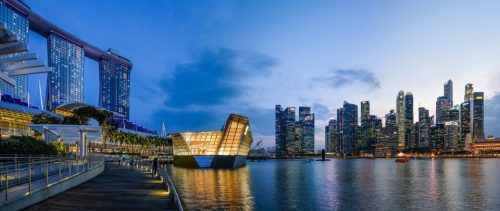
Falsehoods, Facebook, and First-time Budgets
Listen to the full interview here
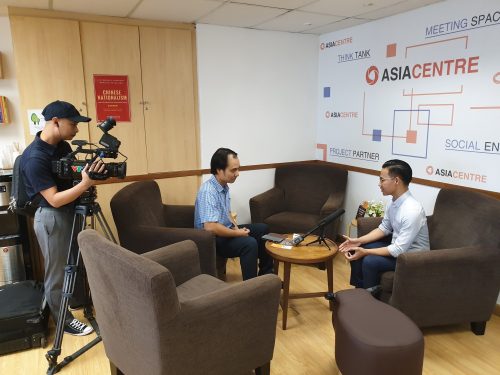
Post-election period in Thailand
Asia Centre’s programme coordinator Yawee Butrkrawee gave an interview to Nguyen Ngoc Phuong from Vietnam Television during 28th March 2019 on the post-election period in Thailand, the likelihood of coalition government and the impacts on Thailand’s foreign policy. He also noted the unprecedented fake news/ online disinformation during the period leading to the election and the roles of youth in Thai politics.
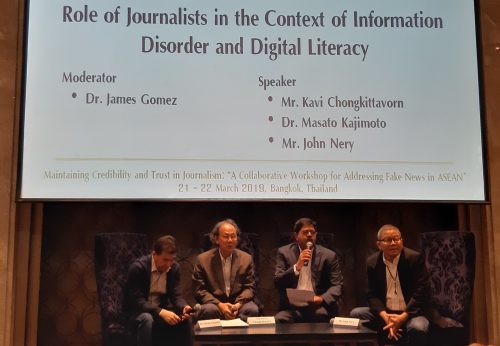
Quality journalism key to fighting fake news
Dr. James Gomez spoke to the Philippine news agency on 22 March 2019 as moderator the panel discussion on the role of journalists in the context of information disorder and digital literacy at the ASEAN Workshop for Addressing Fake News. However, Dr Gomez also said over criminalization” or excessive laws and regulations and vaguely-worded legislation result in legal battles between government officials and individuals or other stakeholders.
Read about the discussion here.
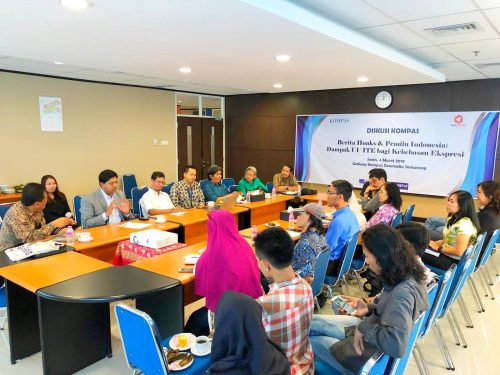
The Community is Comfortable with Fake News that is Sensational
On 4 March 2019, Dr. James Gomez was hosted by the Kompas Daily office in Semarang, Indonesia to speak to journalists at a media literacy roundtable. During that discussion, Dr. Gomez pointed out that the spread of false news is still rife due to unclear regulations and lack of quality filtering in the use of social media. Further, that sensational fake news attracts people to read and share them. The event and contents of the discussion was reported in Bahasa Indonesia, “Masyarakat Masih Senang Kabar Bohong yang Sensasional”.
Read the full article here.

A Right Royal Rumble – Palace Pushes Princess Out Of Race
Dr James Gomez was interviewed on 11 February 2019 by 89.9FM The Business Station on the electoral developments in Thailand following the nomination by Thai Raksa Chart Party of Princess Ubolratana as a Prime Ministerial candidate.
Listen to the full interview here
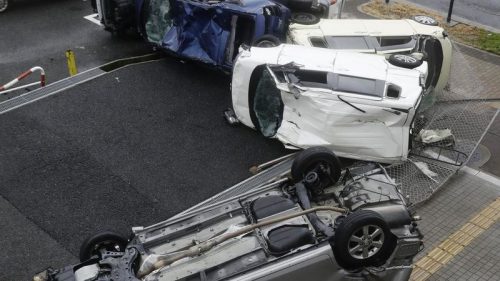
In the name of ‘fake news,’ Asian governments tighten control on social media
In February 8 2019, Dr. James Gomez was quoted in the LA times. James Gomez said “Government officials in Southeast Asia are focusing on social media commentary that causes “reputation harm” to themselves and their institutions, Unlike in the U.S., where Trump is attacking to do reputation damage to the fact-based traditional media,” he said, “in Asia, government representatives are focused on discrediting critics.”
Read the full article here:
